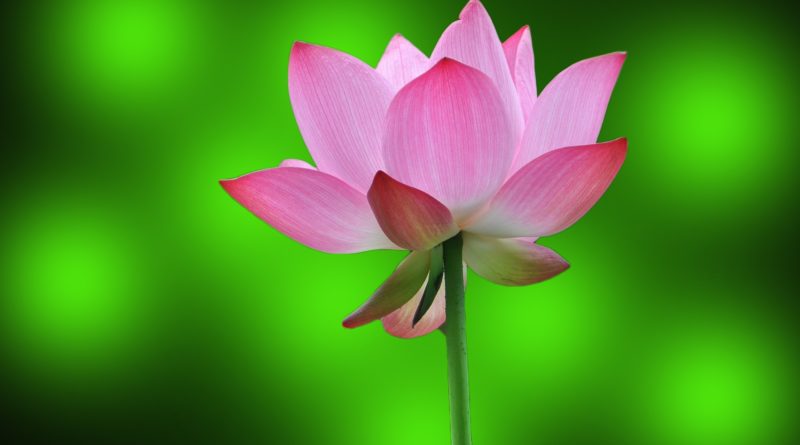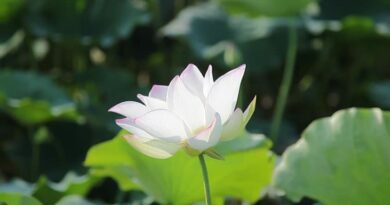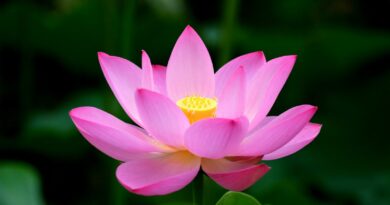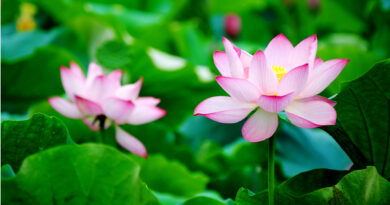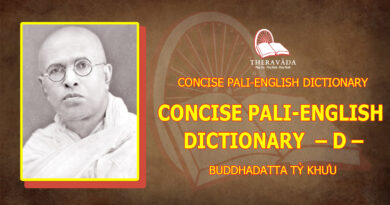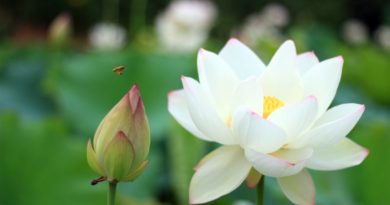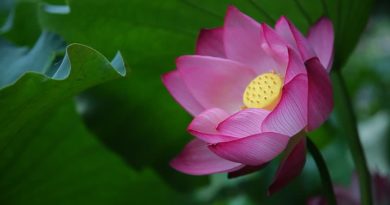ABHIDHAMMA IN DAILY LIFE – CHAPTER 6: THE CHARACTERISTIC OF DOSA
ABHIDHAMMA IN DAILY LIFE – CHAPTER 6: THE CHARACTERISTIC OF DOSA
When we are angry with other people we harm ourselves by our anger. The Buddha pointed out the adverse effects of anger (dosa). We read in the ‘Gradual Sayings’ (Book of the Sevens, Ch.VI, par. 10, Anger) about the ills a rival wishes his rival to have and which are actually the ills coming upon an angry woman or man. The sutta states:
…Monks, there is the case of the rival, who wishes thus of a rival: ‘Would that he were ugly!’. And why? A rival, monks, does not like a handsome rival. Monks, this sort of person, being angry, is overwhelmed by anger; he is subverted by anger: and however well he be bathed, anointed, trimmed as to the hair and beard, clad in spotless linen; yet for all that he is ugly,
being overwhelmed by anger. Monks, this is the first condition, fostered by rivals, causing rivals, which comes upon an angry woman or man.
Again, there is the case of the rival, who wishes thus of a rival: ‘Would that he might sleep badly!’ And why? A rival, monks, does not like a rival to sleep well. Monks, this sort of person, being angry, is overwhelmed by anger… and in spite of his lying on a couch, spread with a fleecy cover, spread with a white blanket, spread with a woollen coverlet, flower embroidered, covered with rugs of antelope skins, with awnings above; or on a sofa, with crimson cushions
at either end; yet for all that he lies in discomfort, being overwhelmed by anger. Monks, this is the second condition….
We then read about other ills a rival wishes for his rival, which come upon an angry woman or man. We read that a rival wishes his rival to be without prosperity, wealth and
fame. Further we read that a rival wishes a rival to be without friends and this happens to someone who is an angry person.
The text states:
‘Monks, this sort of person, being angry… whatever friends, intimates, relations and kinsmen he may have, they will avoid him and keep far away from him, because he is overwhelmed by anger…’
A rival wishes his rival to have an unhappy rebirth and this can happen to an angry person. We read:
‘ … ..Monks, this sort of person, being angry… he misconducts himself in deed, in word and thought; so living, so speaking and so thinking, on the breaking up of the body after death he is reborn in the untoward way, the ill way, the abyss, hell….’
We would like to live in a world of harmony and unity among nations and we are disturbed when people commit acts of violence. We should consider what is the real cause of war and discord between people: it is the defilements which people have accumulated. When we have aversion we think that other people or unpleasant situations are the cause of our aversion. However, our accumulation of dosa is the real cause that aversion arises time and again. If we want to have less dosa we should know the characteristic of dosa and we should be aware of it when it arises.
Dosa has many degrees; it can be a slight aversion or it can be more coarse, such as anger. We can recognize dosa when it is coarse, but do we realize that we have dosa when it is more subtle? Through the study of the Abhidhamma we learn more about the characteristic of dosa. Dosa is an akusala cetasika (mental factor) arising with an akusala citta. A citta rooted in dosa is called in Pali: dosa-mula.citta. The characteristic of dosa is different from the characteristic of lobha. When there is lobha, the citta likes the object which it experiences at that moment, whereas when there is dosa, the citta has aversion towards the object it experiences. We can recognize dosa when we are angry with someone and when we speak disagreeable words to him. But when we are afraid of something it is dosa as well, because one has aversion towards the object one is afraid of. There are so many things in life we are afraid of: one is afraid of the future, of diseases, of accidents, of death. One looks for many means in order to be cured of anguish, but the only way is the development of the wisdom which eradicates the latent
tendency of dosa.
Dosa is conditioned by lobha: we do not want to lose what is dear to us and when this actually happens we are sad. Sadness is dosa, it is akusala. If we do not know things as they are, we believe that people and things last. However, people and things are only phenomena which arise and fall away immediately. The next moment they have changed already. If we can see things as they are we will be less overwhelmed by sadness. It makes no sense to be sad about what has happened already.
In the ‘Psalms of the Sisters’ (Therigatha, 33) we read that the king’s wife Ubbiri mourned the loss of her daughter Jiva. Every day she went to the cemetery. She met the Buddha who told her that in that cemetery about eighty-four thousand of her daughters (in past lives) had been burnt.
The Buddha said to her:
‘O, Ubbiri, who wails in the wood
Crying, O Jiva! O my daughter dear!
Come to yourself! See, in this burying-ground
Are burnt full many a thousand daughters dear,
And all of them were named like unto her.
Now which of all those Jivas do you mourn?’
After Ubbiri pondered over the Dhamma thus taught by the Buddha she developed insight and saw things as they really are; she even attained arahatship.
There are other akusala cetasikas which can arise with cittas rooted in dosa. Regret or worry, in Pali: kukkucca, is an akusala cetasika which arises with dosa-mula-citta at the moment we regret something bad we did or something good we did not do. When there is regret we are thinking of the past instead of knowing the present moment. When we have done something wrong it is of no use having aversion.
Envy (issa) is another cetasika which can arise with dosa-mula-citta. There is envy when we do not like someone else to enjoy pleasant things. At that moment the citta does
not like the object it experiences. We should find out how often envy arises, even when it is more subtle. This is a way to know whether we really care for someone else or whether we only think of ourselves when we associate with others.
Stinginess (macchariya) is another akusala cetasika which may with dosa-mula-citta. When we are stingy there is dosa as well. At that moment we do not like someone else to share in our good fortune.
Dosa always arises with an unpleasant feeling (domanassa vedana). Most people do not like to have dosa because they do not like to have an unpleasant feeling. As we develop more understanding of realities we want to eradicate dosa not so much because we dislike unpleasant feeling but rather because we realize the adverse effects of akusala.
The doorways through which dosa can arise are the five sense-doors and the mind-door. It can arise when we see ugly sights, hear harsh sounds, smell unpleasant odours, taste unappetizing food, receive painful bodily impressions and think of disagreeable things. Whenever there is a feeling of uneasiness, no matter how slight, it is a sign that there is dosa. Dosa may often arise when there are unpleasant impressions through the senses, for example, when the temperature is too hot or too cold. Whenever there is a slightly unpleasant bodily sensation dosa may arise, be it only of a lesser degree.
Dosa arises when there are conditions for it. It arises so long as there is still attachment to the objects which can be experienced through the five senses. Everybody would like to experience only pleasant things and when we do not have them any more, dosa can arise.
Another condition for dosa is ignorance of Dhamma. If we are ignorant of kamma and vipaka, cause and result., dosa may arise very easily on account of an unpleasant experience through one of the senses and thus dosa is accumulated time and again. An unpleasant experience through one of the senses is akusala vipaka caused by an unwholesome deed we perforrned. When we, for example, hear unpleasant words from someone else we may be angry with that person. Those who have studied Dhamma know that hearing something unpleasant is akusala vipaka which is not caused by someone else but by an unwholesome deed we performed ourselves. A moment of vipaka falls away immediately, it does not stay. Are we not inclined to keep on thinking about an unpleasant experience? If there is more awareness of the present moment one will be less inclined to think with aversion about one’s akusala vipaka.
When we study the Abhidhamma we learn that there are two types of dosa-mula-citta; one is asarikharika (unprompted) and one is sasankharika (prompted). Dosa is sasankharika prompted) when, for example, one becomes angry after having been reminded of the disagreeable actions of someone else. When dosa is sankharika (unprompted) it is more intense than when it is sasankharika. Dosa-mula-cittas are called patigha.sampayutta, or accompanied by patigha, which is another word for dosa. Dosa.mula-cittas are always accompanied by domanassa (unpleasant feeling). The two type of dosa-mula-citta are:
- Accompanied by unpleasant feeling, arising with anger, unprompted (Domanassa-sahagatam, patigha-sampayuttam, asankharikam ekam)
- Accompanied by unpleasant feeling, arising with anger, prompted (Domanassa-sahagatam,
patigha-sampayuttam, sasankharikam ekam)
As we have seen, there are many degrees of dosa; it may be coarse or more subtle. When dosa is coarse, it causes akusala kamma-patha (unwholesome deeds) through body, speech or mind. Two kinds of akusala kamma-patha through the body can be performed with dosa-mula-citta: killing and stealing. If we want less violence in the world we should try not to kill. When we kill we accumulate a great deal of dosa. The monk’s life is a life of non-violence; he does not hurt any living being in the world. However, not everyone is able to live like the monks. Defilements are anatta (not self); they arise because of conditions. The purpose of the Buddha’s teachings is not to lay down rules which forbid people to commit ill deeds, but to help people to develop the wisdom which eradicates defilements.
As regards stealing, this can either be performed with lobha-mula-citta or with dosa-mula-citta. It is done with dosa-mula-citta when there is the intention to harm someone else. Doing damage to someone else’s possessions is included in this kamma-patha.
Four kinds of akusala kamma-patha through speech are performed with dosa-mula-citta: lying, slandering, rude speech and frivolous talk. Lying, slandering and frivolous talk can either be done with lobha-mula-citta or with dosa-mula-citta. Slandering, for example, is done with dosa-mula-citta when there is the intention to cause damage to someone else, such as doing harm to his good name and causing him to be looked down upon by others. Most people think that the use of weapons is to be avoided, but they forget that the tongue can be a weapon as well, which can badly wound. Evil speech does a great deal of harm in the world; it causes discord between people. When we speak evil we harm ourselves, because at such moments akusala kamma is accumulated and it is capable of producing akusala vipaka. We read in the ‘Sutta Nipata’ (the Great Chapter, ‘Khuddaka Nikava’):
Truly to every person born
An axe is born within his mouth
Wherewith the fool cuts himself
When he speaks evil.
As regards akusala kamma-patha through the mind performed with dosa-mula-citta, this is the intention to hurt or harm someone else.
People often speak about violence and the ways to cure It. Who of us can say that he is free from dosa and that he will never kill? We do not know how much dosa we have accumulated in the course of many lives. When the conditions are there we might commit an act of violence we did not realize we were capable of. When we understand how ugly dosa and to what deeds it can lead we want to eradicate it.
In doing kind deeds to others we cannot eradicate the latent tendency of dosa, but at least at those moments we do not accumulate more dosa. The Buddha exhorted people to cultivate lovingkindness (metta). We read in the ‘Karaniya Metta-sutta’; (Sutta Nipata, vs. 143-152 : I am using the translation by Nanamoli Thera, Buddhist Publicafion Society, Kandv, Sri Lanka.) what one should do in order to gain the ‘state of peace’. One should have thought of love for all living beings:
. …In safety and in bliss
May creatures all be of a blissful heart.
Whatever breathing beings there may be,
No matter whether they are frail or firm,
With none excepted, be they long or big
Or middle-sized, or be they short or small
Or thick, as well as those seen or unseen,
Or whether they are dwelling far or near,
Existing or yet seeking to exist,
May creatures all be of a blissful heart.
Let no one work another one’s undoing
Or even slight him at all anywhere;
And never let them wish each other ill
Through provocation or resentful thought.
And just as might a mother with her life
Protect the son that was her only child,
So let him then for every living thing
Maintain unbounded consciousness in being,
And let him too with love for all the world
Maintain unbounded consciousness in being
Above, below, and all around in between,
Untroubled, with no enemy or foe….
The Buddha taught us not to be angry with those who are unpleasant to us. We read in the Vinaya (Mahavagga X, 349 : Translation by Nanamoli Thera.) that the Buddha said to the monks:
They who (in thought) belabour this: That man has me abused, has hurt, has worsted me,
has me despoiled: in these wrath is not allayed.
They who do not belabour this: That man has me abused, has hurt, has wosted me, has me despoiled: in them wrath is allayed.
Nay, not by wrath are wrathful moods allayed here (and) at any time, but by not-wrath are they allayed: this is an (ageless) endless rule….
At times it seems impossible for us to have metta instead of dosa. For example, when people treat us badly we may feel very unhappy and we keep on pondering over our misery. When dosa has not been eradicated there are still conditions for it to arise. In being mindful of all realities which appear the wisdom is developed which can eradicate dosa.
Dosa can only be eradicated stage by stage. The sotapanna (who has attained the first stage of enlightenment) has not yet eradicated dosa. At the subsequent stage of enlightenment, the stage of the sakadagami (once-returner), dosa is not yet eradicate completely. The anagami (non-returner, who has attained the third stage of enlightenment) has eradicated dosa completely; he has no more latent tendency of dosa.
We have not eradicated dosa, but when dosa appears, we can be mindful of its characteristic in order to know it as a type of nama, arising because of conditions. When there is no mindfulness of dosa when it appears, dosa seems to last and we take it for self; neither do we notice other namas and rupas presenting themselves. Through mindfulness of namas and rupas which present themselves one at a time, we will learn that there are different characteristics of nama and rupa, none of which stays; and we will also know the characteristic of dosa as only a type of nama, not self.
When a clearer understanding of realities is developed we will be less inclined to ponder for a long time over an unpleasant experience, since it is only a type of nama which does not last. We will attend more to the present moment instead of thinking about the past or the future. We will also be less inclined to tell other people about unpleasant things which have happened to us, since that may be a condition both for ourselves and for others to accumulate more dosa. When someone is angry with us we will have more
understanding of his conditions; he may be tired or not feeling well. Those who treat us badly deserve compassion because they actually make themselves unhappy.
Right understanding of realities will help us most of all to have more lovingkindness and compassion towards others instead of dosa.
-ooOoo-
Questions
- Why is lobha a condition for dosa?
2. Lying, slandering and frivolous talk are akusala kamma-patha through speech which can be performed either with lobha-mula-citta or with dosa-mula-citta. When are they performed with dosa-mula-citta?
3. Is there akusala kamma-patha through the mind performed with dosa-mula-citta?

